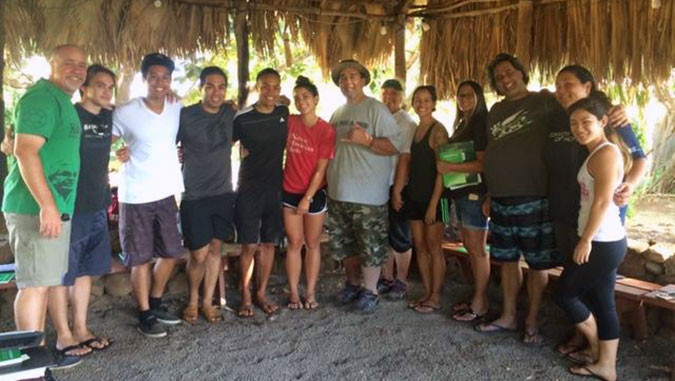
Many University of Hawaiʻi at Mānoa social work students identify as Indigenous and specifically Native Hawaiian. Under the guidance of cultural practitioners, community social workers and faculty members Lynette Paglinawan and Malina Kaulukukui, the Native Hawaiian Interdisciplinary Health (NHIH) program was created in spring 2012 as a collaboration between UH Mānoa’s John A. Burns School of Medicine, Native Hawaiian Center of Excellence and the Myron B. Thompson School of Social Work, BSW Program. Since it began, the NHIH program has continued to create a space for students to recognize that their cultural identity can be an integral part of their professional identity according to an article published in Intersectionalities.
The NHIH program was designed to enrich the curriculum with Indigenous pedagogy and epistemology that validate an Indigenous worldview, create additional space within the academy for Indigenous discourse while also taking advantage of ʻaina (land) based space, and put Native Hawaiian students into direct contact with Kānaka Maoli (Native Hawaiian) physicians and social workers.
“While qualitative data reveal the program to be effective, it may be more valuable as a platform from which to explore academic decolonization and the Indigenization of academic space, curriculum and instruction,” said UH Mānoa social work faculty Michael C. DeMattos.
Exploring colonial nature
The hope is that the NHIH program can function as a platform from which to explore the colonial nature of the academy and potential strategies for disrupting the pedagogies and epistemologies that serve as a barrier to both Native Hawaiian recruitment and retention for the medical and social work professions. It is important that non-Indigenous and Indigenous instructors identify their position relative to the colonial project. In doing so, they help haumāna (students) create new subjectivities that acknowledge their personal and historical agency and recognize survivorship.
“The NHIH creates a safe space where Kānaka Maoli haumāna can bring the full breadth and depth of their cultural identities to bear on the educational experience and in turn develop a professional identity that is culturally informed,” said DeMattos.
The Indigenous curriculum anchored in Native Hawaiian values creates opportunities for advanced discussion on a variety of subjects. Specifically, content on cultural-historical trauma, well-being and healing as housed in the community, and the de-othering of haumāna are centered in the curriculum.

